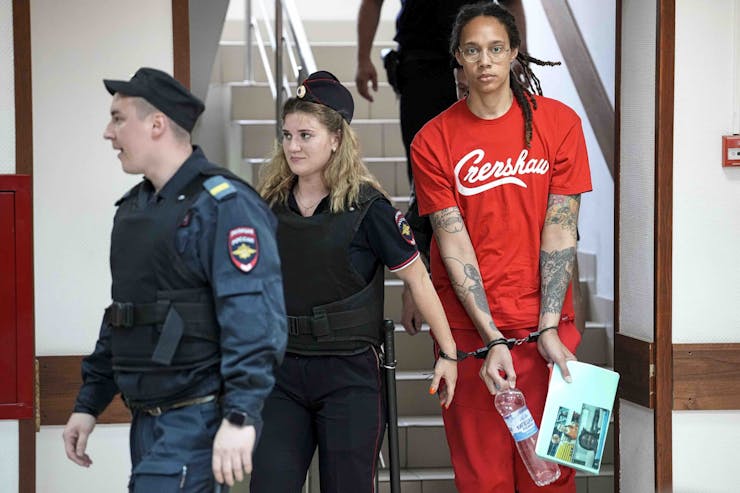MOSCOW — Jailed American basketball star Brittney Griner on Thursday pleaded guilty to drug possession during her trial in Moscow but said she had no intention of committing a crime.
Representatives for Griner confirmed to The Associated Press that the WNBA star pleaded guilty to drug possession charges.
Russian news reports quoted Griner as saying through an interpreter at the court hearing that she had acted unintentionally because she was packing in haste. Cannabis is legal for all adults in Arizona, where Griner plays for the WNBA’s Phoenix Mercury.
Griner was detained in February at Moscow’s Sheremetyevo Airport after vape canisters with cannabis oil allegedly were found in her luggage. She faces up to 10 years in prison if convicted of large-scale transportation of drugs.
Trial began last week
The trial of the WNBA star and two-time Olympic gold medalist began last week amid a growing chorus of calls for Washington to do more to secure her freedom nearly five months after her arrest.
Before Thursday’s hearing, Russian police escorted Griner, handcuffed and clad in a bright red T-shirt and sports trousers, into the courtroom past a crowd of journalists.
The athlete was detained in February at Moscow’s Sheremetyevo Airport after vape canisters with cannabis oil allegedly were found in her luggage. She faces up to 10 years in prison if convicted of large-scale transportation of drugs.
Letter from President Biden
Elizabeth Rood, deputy chief of mission at the U.S. Embassy in Moscow, told reporters after the hearing that she spoke to Griner in the courtroom and shared a letter from President Joe Biden that she read.
“She’s eating well, she’s able to read books and under the circumstances she’s doing well,” Rood said of Griner.
“I would like again to emphasize the commitment of the U.S. government at the very highest level to bring home safely Ms. Griner and all U.S. citizens wrongfully detained as well as the commitment of the U.S. Embassy in Moscow to care for and protect the interests of all U.S. citizens detained or imprisoned in Russia,” Rood said.
Russian official: She’s not ‘wrongfully detained’
Russian Deputy Foreign Minister Sergei Ryabkov bristled at the U.S. description of Briner as “wrongfully detained” and warned that “attempts by the American side to make noise in public … don’t help the practical settlement of issues.”
The White House said Biden called Griner’s wife on Wednesday to assure her that he’s doing all he can to obtain the athlete’s release, as soon as possible. They spoke after Biden read a letter from Griner in which she said she feared she’d never return home.
Washington hasn’t made public its strategy in the case and the United States may have little leverage with Moscow because of strong animosity due to Russia’s military actions in Ukraine. The State Department has designated Griner as wrongfully detained, moving her case under the supervision of its special presidential envoy for hostage affairs, effectively the government’s chief hostage negotiator.
Possible prisoner swap in the future
Asked about the possibility of Griner being swapped for a Russian jailed in the U.S., Ryabkov, the senior Russian diplomat, noted that until her trial is over “there are no formal or procedural reasons to talk about any further steps.”
He warned that U.S. criticism, including a description of Griner as wrongfully detained and dismissive comments about the Russian judicial system, “makes it difficult to engage in detailed discussion of any possible exchanges.”
“The persistence with which the U.S. administration … describes those who were handed prison sentences for serious criminal articles and those who are awaiting the end of investigation and court verdicts as ‘wrongfully detained’ reflects Washington’s refusal to have a sober view of the outside world,” Ryabkov snapped.
Trial delayed
Griner’s trial was adjourned after its start last week because two scheduled witnesses did not appear. Such delays are routine in Russian courts and her detention has been authorized through Dec. 20, suggesting the proceedings could last months.
Although Griner’s supporters initially kept a low profile, calls for the United States to take action spiked after the trial’s first day.
The Rev. Al Sharpton, one of America’s most prominent Black activists, this week called for Biden to arrange a prayer meeting with Griner, saying, “Four months is too long for this to have gone on, and I hope the President acts on her pleas to come home.”
An organization called Win With Black Women sent Biden a letter saying Secretary of State Antony Blinken “has called Cherelle Griner, Brittney’s wife, assuring her and stating publicly that Brittney’s safe return was a matter of personal priority; however, we are concerned that the rhetoric does not appear to align with the actions taken to date. We urge you to make a deal to get Brittney back home swiftly.”
What a possible swap might involve
Russian news media have repeatedly speculated that Griner could be swapped for Russian arms trader Viktor Bout, nicknamed “the Merchant of Death,” who is serving a 25-year sentence in the U.S. on conviction of conspiracy to kill U.S. citizens and providing aid to a terrorist organization.
Russia has agitated for Bout’s release for years. But the wide discrepancy between Griner’s alleged offense and Bout’s global dealings in deadly weapons could make such a swap unpalatable to Washington.
Others have suggested that she could be traded along with Paul Whelan, a former Marine and security director serving a 16-year sentence in Russia on an espionage conviction that the U.S. has repeatedly described as a setup.
Russia has shown no signs of backing off.
“This is a serious offense, confirmed by indisputable evidence … Attempts to present the case as if the American was detained illegally do not hold up,” Foreign Ministry spokesman Alexei Zaitsev said Wednesday.
“The law has been violated, and arguments about the innocent nature of Griner’s addiction, which, by the way, is punishable in some U.S. states, are inappropriate in this case,” he said.




